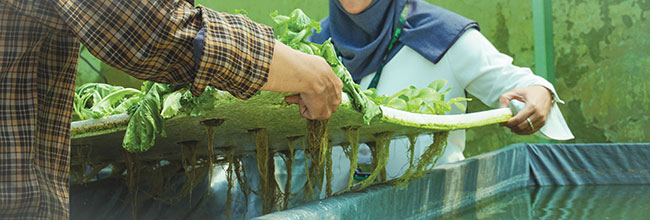
Aquaponics could spur youth to take up aquaculture
May 31, 2022
By Arsenia King
 Photo: © Rendi Brahma / Adobe Stock
Photo: © Rendi Brahma / Adobe Stock It takes greater commitment and passion to grow aquatic fish in fish farms than to raise them in backyard aquaponics systems, yet educators at the Lake Superior State University (LSSU) believe that building interest in aquaponics maybe “the best path forward to building an educated workforce in aquaculture”.
The Michigan-based state university currently offers Associate of Applied Science Degree in Aquaponics Entrepreneurship, a diploma that blends aquaponics studies with engineering/automation and business – three areas they believe are critical to the adoption and growth of aquaponics business. The integration of aquaponics in LSSU’s curriculum is 10 years in the making and was meant to address the seeming lack of interest in aquaculture among the youth.
“Aquaculture does not seem to attract large numbers of youth. Where we do see a lot of interest is in aquaponics” said Dr Barbara Evans, professor at LSSU, in her presentation at the recently concluded Aquaculture 2022 conference in San Diego, CA.
According to Evans, studies indicate that young people in general are not interested in all types of farming, but in areas such as the Midwest in the United States where aquaculture is less common, a mindset for the industry needs to be developed as well.
Since aquaponics blends traditional aquaculture with hydroponics, LSSU proposes building an educational model around aquaponics to inspire the youth to learn about aquaculture.
This means moving aquaponics from the backyard on to campus and elevating the study from a hobby or interest to that of an integrated science requiring an understanding of STEM at the university level.
LSSU’s diploma in Aquaponics Entrepreneurship is well thought-off. For instance, the aquaponics component of the course helps students understand how to keep plants and aquatic organisms alive, which entails studying basic biology, water quality, nutrition, as well as the options for different system designs.
The engineering component, on the other hand, addresses system automation with independent study on aquaponics systems, pumps, power tools, etc.
The business component includes accounting and marketing skills, as well as an independent study/internship in entrepreneurship which are essential to a successful aquaponics business.
LSSU provides student access to hands-on learning in the aquaponics hoop house, which incorporates study on solar energy alternatives using the two full aquaponics systems in the basement of the campus’ science building.
The LSSU finds it challenging to introduce new curricula to potential students without demonstrating a market need. This explains the difficulty in drawing interest to the course in places where people have little awareness of the aquaculture industry.
The school had to determine the level of exposure to aquaculture in different high schools, mapped their locations and looked for extension services and successful aquaculture businesses within the vicinity.
They also incentivized interest from high school students through a competition called the Aquaculture Challenge with fundings from the Michigan Sea Grant program.
Under the program, schools or after-school organizations create their own small-scale aquaponics system and monitor the system parameters such as air and water temperature, luminosity, and soil moisture, among others.
The program also involves creating business plans and culinary demonstrations using ingredients harvested from the aquaponics systems.
Interestingly, the competition revealed that students quickly surpassed their teachers’ knowledge of aquaculture, so the program developed and hosted workshops for the teachers to better prepare them to mentor their students.
The LSSU believes aquaponics has the potential to dramatically increase access to local food, even in northern climates, but its biggest growth barriers remains the lack of an educated workforce. STEM education, they believe, will provide the basic skills and knowledge needed to enter the aquaculture industry.
Advertisement
- The Canadian Food Innovation Network announces investment of $3 million
- Paycheck a priority for industry workers looking to move jobs





